Current Position: History>>2014
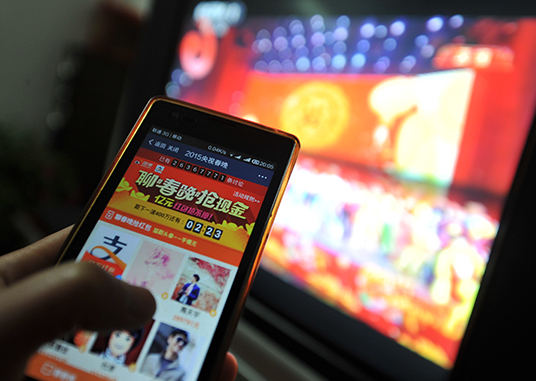
Annual Review
We are now at the integration and innovation stage. Since China put forward the strategy of building itself into a Cyber Power in 2014, innovations in the Internet industry have been deeply integrated with all aspects of economic and social life, the "Internet +" Initiative has been fully implemented and Internet governance has entered into a new phase of reinforced coordination.Key Events
-
Feb.27On February 27, the Office of the Central Leading Group of Cyberspace Affairs was set up
-
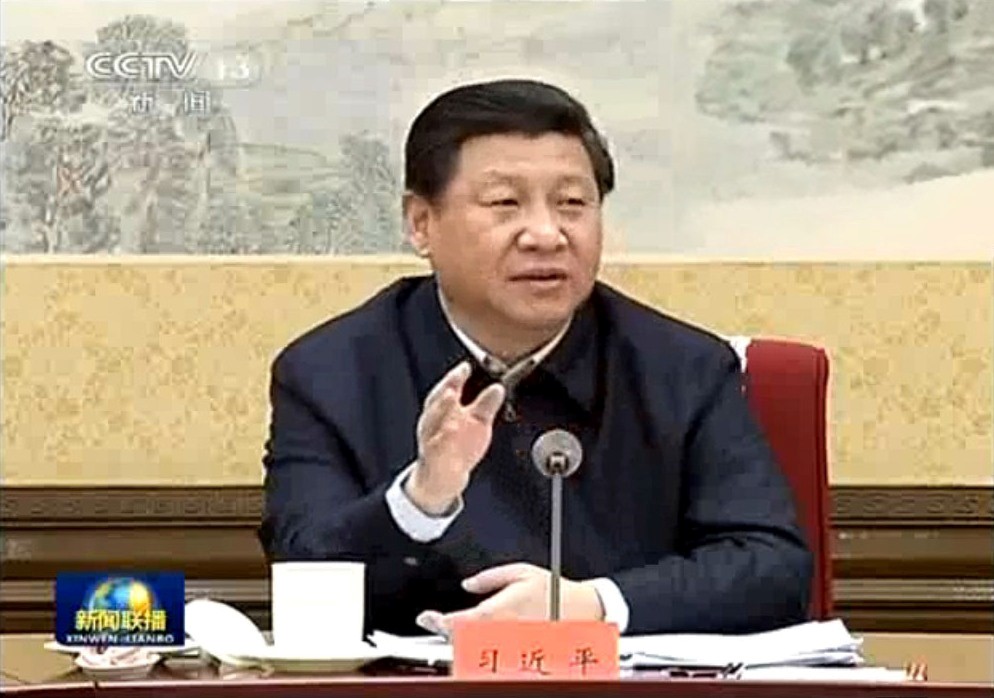 On February 27, 2014, the Office of the Central Leading Group of Cyberspace Affairs was set up and held its first meeting in Beijing. The Group was headed by Chinese President Xi Jinping, and its vice heads were Li Keqiang and Liu Yunshan. At the meeting, the Work Rules of the Office of the Central Leading Group of Cyberspace Affairs , the Work Conditions of the Office of the Central Leading Group for Cyberspace Affairs and the Key Work of the Central Leading Group for Cyberspace Affairs in 2014 were reviewed and adopted and the recent work was discussed about.
On February 27, 2014, the Office of the Central Leading Group of Cyberspace Affairs was set up and held its first meeting in Beijing. The Group was headed by Chinese President Xi Jinping, and its vice heads were Li Keqiang and Liu Yunshan. At the meeting, the Work Rules of the Office of the Central Leading Group of Cyberspace Affairs , the Work Conditions of the Office of the Central Leading Group for Cyberspace Affairs and the Key Work of the Central Leading Group for Cyberspace Affairs in 2014 were reviewed and adopted and the recent work was discussed about.
At the meeting, Chinese President Xi Jinping pointed out that "No Internet safety means no national security. No informatization means no modernization". In Xi's view, building a cyber power calls for domestically developed solid technology, rich and comprehensive information services, prosperous cyber cultures, sound infrastructure, high-caliber talents working in Internet security and information, as well as international cooperation. The strategic deployments of building a cyber power shall be pushed forward at the same time with efforts to meet the goal of “two 100 years”, in order to basically popularize cyber infrastructure, remarkably enhance the ability of indigenous innovation, comprehensively develop information economy and strongly guarantee cyber security.
Xi Jinping stressed that the Office of the Central Leading Group of Cyberspace Affairs should lead in a unified and centralized way, make overall plans and coordinate Internet security and informatization among different sectors, as well as draft national strategies, development plans and major policies in this field, so as to keep improving the capabilities of security assurance.
-
Jan.27On January 27, Cyber Administration of Beijing announced the Clear Action in Beijing
-
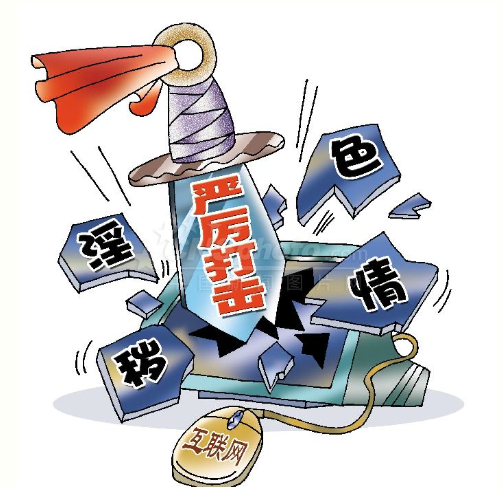 On January 27, 2014, the Clear Action was launched against porn and vulgar information on the Internet in Beijing. The participants to the campaign included Beijing Municipal Public Security Bureau, Beijing Communications Administration, as well as over 30 websites including qianlong , sina .cn, sohu , 163 and baidu .
On January 27, 2014, the Clear Action was launched against porn and vulgar information on the Internet in Beijing. The participants to the campaign included Beijing Municipal Public Security Bureau, Beijing Communications Administration, as well as over 30 websites including qianlong , sina .cn, sohu , 163 and baidu .
The Clear Action mainly targeted at porn and vulgar information on the Internet, severely punished advertisements of and links to port website, cracked down on “pornographic marketing” and vulgar hype of website as well as spreading porn and vulgar information via search engine, and intensified the inspection on network applications including online video playing software and network hard disk that are frequently used by youngsters and are potentially problematic, so as to effectively guard against pornographic and vulgar information.
The Clear Action aimed to promote the development of cyber space and make it clean and chipper through the coordinated efforts of all relevant departments and the general public. The campaign has started, but will never end.
-
Jan.29On January 29, MIIT issued the second batch of licenses for virtual operators
-
 On January 29, 2014, MIIT issued the second batch of licenses for virtual operators to eight companies including Beijing Gome Co., Ltd. and Suning Corporation. Currently, a total of 19 companies including those that had got the first batch of licenses for virtual operators on December 26, 2013 have acquired the license.
On January 29, 2014, MIIT issued the second batch of licenses for virtual operators to eight companies including Beijing Gome Co., Ltd. and Suning Corporation. Currently, a total of 19 companies including those that had got the first batch of licenses for virtual operators on December 26, 2013 have acquired the license.
The issuance of virtual license indicated that private capital was finally allowed to legally take part in the competitions among monopoly telecom companies. The practice was not only helpful to invigorate the vitality of the industry but also could promote the properity of the telecom market. It was an iconic event and milestone of the telecom reform. The above moves were based on the Implementing Opinions of the Ministry of Industry and Information Technology on Encouraging and Guiding the Entry of Private Capital into the Telecommunications Industry issued by MIIT on June 27, 2012. The file defined the eight key fields of the telecom industry that the government encourages and guides the entry of private capital, of which the reform of “encouraging trial mobile telecommunications resale services by using private capital” that ranks first attracted much attention.
Virtual operators were allowed to lease services from the three key telecom operators and repackage and sell such services, and they had the independent pricing right. Thanks to the good news, people were very optimistic about the development of virtual operators in the future.
-
Jan.6On January 6, Didi Dache announced its exclusive access to WeChat
-
 On January 6, 2014, Didi Dache announced its exclusive access to WeChat, allowing online hailing and payment via WeChat. Meanwhile, Didi Dache announced news that it had completed the Round C financing with an amount of USD100 million.
On January 6, 2014, Didi Dache announced its exclusive access to WeChat, allowing online hailing and payment via WeChat. Meanwhile, Didi Dache announced news that it had completed the Round C financing with an amount of USD100 million.
In response to the access of Didi Dache to WeChat, Kuaidi gave allowance to its customers who use Alipay.
On January 1, Kuaidi announced that its new users who had used Kuaidi for the first time in Beijing would get a rebate of phone charge of RMB30. The campaign lasted one month and it was estimated that the total investment had exceeded RMB100 million.
On January 10, Didi Dache announced that the taxi passenger who used WeChat to pay fare will get a rebate of RMB10, meanwhile, it would give an allowance of RMB10 to the tax driver for each deal made. In addition, it launched a campaign of free of charge for one out of every 10,000 tax passengers by lot.
On January 20, Kuaidi followed suit to launch an campaign that was similar to that of Didi Dache to subsidize its passengers and drivers.
On February 10, Didi Dache declared the closing of the promotional activity of RMB10 rebate through WeChat payment and the reduction of subsidy from the previous RMB10 per deal to RMB5 per deal.
On February 12, Kuaidi reduced its award for drivers in Beijing, Shanghai, Shenzhen and Hangzhou from the previous RMB15 per deal to RMB10 per deal, and reduced its award for drivers in other cities from RMB15 per deal to RMB5 per deal.
On February 17, Didi Dache announced that the passenger who pays fare via WeChat could get a rebate of RMB10, up to three times each day, and a passenger who takes a Didi Dache for the first time and pays the fare via WebChat could get a rebate of RMB15.
On February 18, Kuaidi upgraded its incentive plan, promising that its reward to the passengers who had taken Kuaidadi taxi and paid the fare via Alipay always RMB1 higher than that from its competitors. Relevant statistics show that Didi Dache has employed 350,000 drivers while the number of users of Kuaidi has reached 23 million.
The competition between Didi Dache and Kuaidi reflected the struggle between Tencent and Alibaba. Didi Dache was backed by Tencent while Kuaidi was backed by Alibaba. The competition was virtually the scramble between Tencent and Alibaba for offline customers.
-
Jan.30In January, Lenovo successively acquired IBM X86 server hardware and relevant maintenance business and Motorola Mobility
-
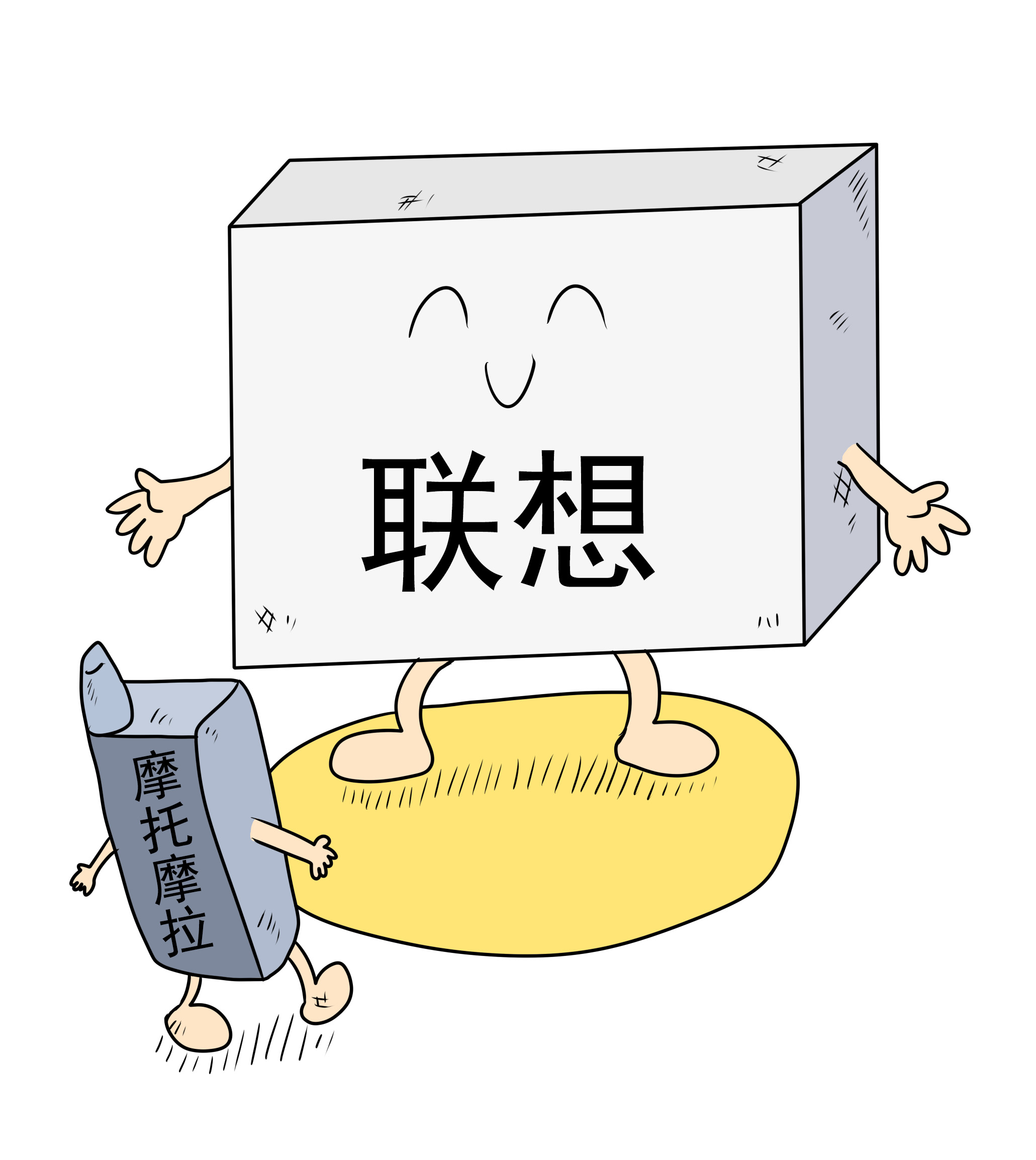 On January 30, 2014, Lenovo Group acquired Motorola Mobility from Google at a cost of USD2.9 billion, which comprised of USD1,410 million paid upon the completion of the acquisition (consisting of USD660 million in cash and USD750 million in Lenovo ordinary stock), while the remaining USD1.5 billion would be paid in a three-year promissory note. The acquisition of Lenovo involved the brand of Motorola as well as innovative smartphones like Moto X, Moto G and DROIDTM Ultra series. In addition to the current products, Lenovo will take ownership of the future Motorola Mobility product roadmap, and will receive a license to the rich portfolio of relevant patents and other intellectual property rights. Additionally, Lenovo will receive over 2,000 patent assets, as well as the Motorola Mobility brand and trademark portfolio.
On January 30, 2014, Lenovo Group acquired Motorola Mobility from Google at a cost of USD2.9 billion, which comprised of USD1,410 million paid upon the completion of the acquisition (consisting of USD660 million in cash and USD750 million in Lenovo ordinary stock), while the remaining USD1.5 billion would be paid in a three-year promissory note. The acquisition of Lenovo involved the brand of Motorola as well as innovative smartphones like Moto X, Moto G and DROIDTM Ultra series. In addition to the current products, Lenovo will take ownership of the future Motorola Mobility product roadmap, and will receive a license to the rich portfolio of relevant patents and other intellectual property rights. Additionally, Lenovo will receive over 2,000 patent assets, as well as the Motorola Mobility brand and trademark portfolio.
The acquisition of Motorola Mobility business will help Lenovo further clinch the position of Lenovo in the market of smart terminals (including PC, tablet PC and smart phone) and narrow down its gap between Apple Inc and Samsung Electronics. According to the research report of Gartner, a market research agency, Lenovo Group is currently the world’s third largest smartphone vendor, next only to Samsung Electronics and Apple Inc and Samsung Electronics. Lenovo expected that the acquisition could bring the Motorola Mobility business on a healthy track with profitable growth and help it challenge Samsung Electronics and Apple Inc and Samsung Electronics, which took the first two places in the field of smartphone.
Lenovo's acquisition of IBM X86 server has made the ranking of its server business rise from the 6st to the 3rd in the world. While the acquisition of Motorola Mobility can help Lenovo enrich and improve its product lines and make its mobile phone business edge into the international market by relying on the brand influence of Motorola. Both the acquisitions of IBM or Motorola Mobility show that Lenovo Group is determined to gain a firm foothold in the international market.
-
Jan.27On January 27, Tencent launched "WebChat Red Envelop"
-
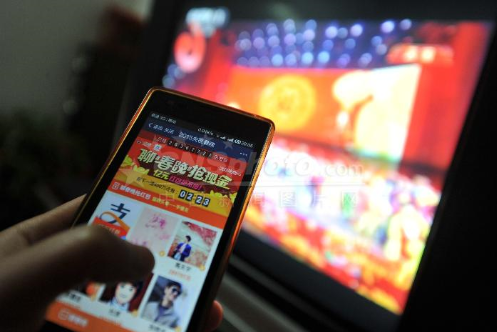 On January 27, 2014, Tencent launched the app of "WeChat Red Envelop". The “WeChat Red Envelop" is backed by the public account of "Chinese New Year Red Envelope" operated by Tenpay and its functions include delivering virtual money, checking a transaction history list and withdrawing cash. "WeChat Red Envelop" is easy to use, its users, through the public account of "Chinese New Year Red Envelope", can assign the number and amount of the red envelop as well as good wishes to the recipient before making a payment through "WeChat Payment"; after receiving a red envelop, the recipient can get corresponding virtual money after opening the red envelop and can withdraw the money after one work day if his/her deposit card is associated with WeChat.
On January 27, 2014, Tencent launched the app of "WeChat Red Envelop". The “WeChat Red Envelop" is backed by the public account of "Chinese New Year Red Envelope" operated by Tenpay and its functions include delivering virtual money, checking a transaction history list and withdrawing cash. "WeChat Red Envelop" is easy to use, its users, through the public account of "Chinese New Year Red Envelope", can assign the number and amount of the red envelop as well as good wishes to the recipient before making a payment through "WeChat Payment"; after receiving a red envelop, the recipient can get corresponding virtual money after opening the red envelop and can withdraw the money after one work day if his/her deposit card is associated with WeChat.
Meanwhile, Alipay and Sina Weibo also launched similar functional services. After the WeChat red envelop was launched, Alipay introduced the app of "New Year Wallet", with a total of 4 features of "From Boss", "From Wife/Husband", "From Relatives" and "From Colleages". Sina Weibo continued to launch the campaign of "Let Hongbao Fly", and its participants can have a lucky draw through forwarding, comment and Like, etc.
According to relevant statistics, within just two days from Chinese New Year's Eve to Chinese New Year, the application recorded over five million transactions, with over 9,000 transactions per minute on average. The application of "WeChat Red Envelop" really led the new fashion of celebrating the Spring Festival and gave birth to numerous new customers of mobile payment.
-
Jan.30On January 30, Tencent's market value exceeded HKD1 trillion for the first time
-
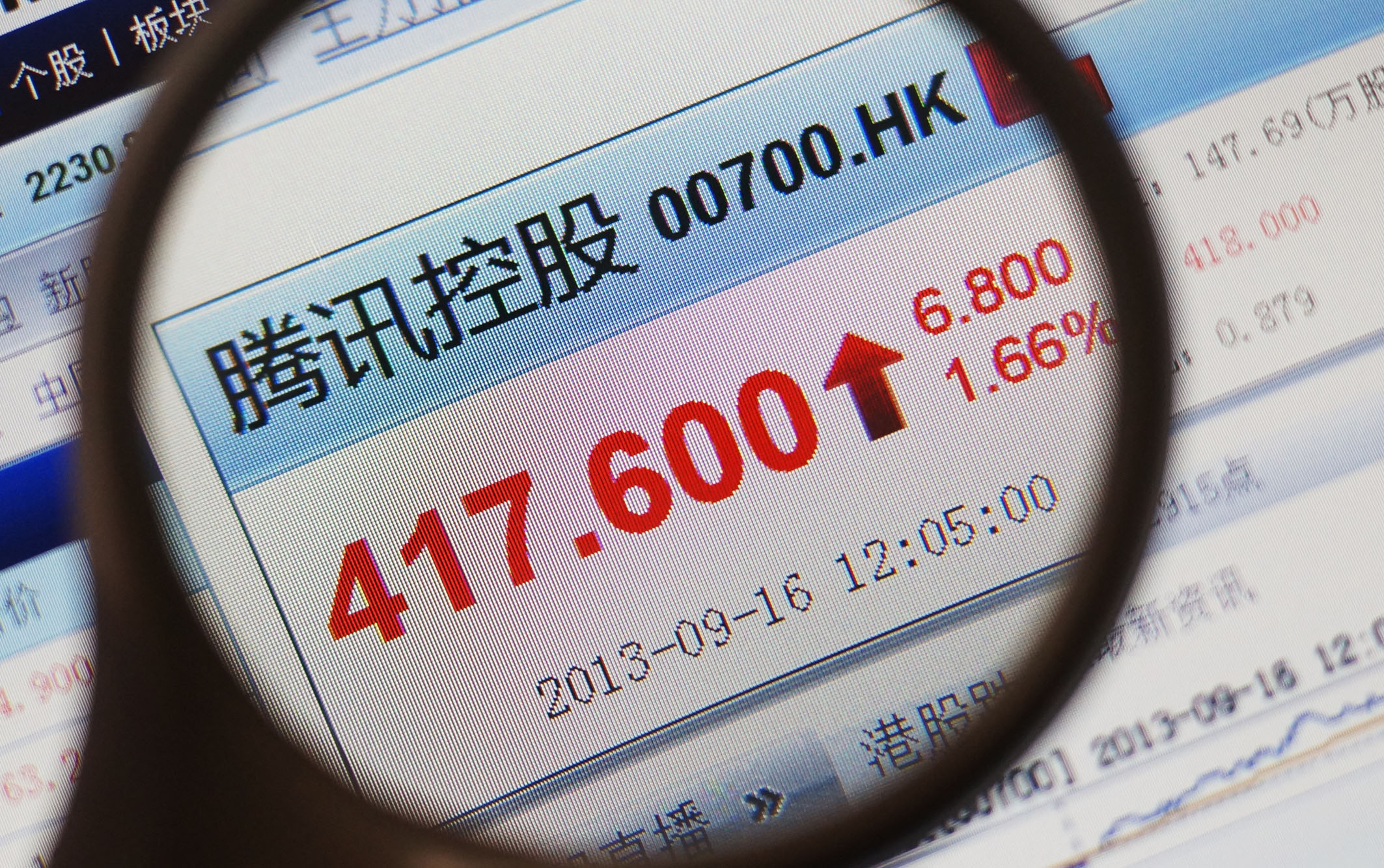 On January 30, 2014, the opening price of Tencent (0070) was HKD520 per share and kept rising up to HKD545 on the morning of the day. By the closing at 12:00 at noon, the stock price reached HKD543.5, and its market value exceeded HKD1 trillion. Tencent is the fourth Chinese company with the market value exceeding HKD1 trillion after HSBC Holdings (00005), China Mobile (00941) and China Construction Bank (00939).
On January 30, 2014, the opening price of Tencent (0070) was HKD520 per share and kept rising up to HKD545 on the morning of the day. By the closing at 12:00 at noon, the stock price reached HKD543.5, and its market value exceeded HKD1 trillion. Tencent is the fourth Chinese company with the market value exceeding HKD1 trillion after HSBC Holdings (00005), China Mobile (00941) and China Construction Bank (00939).
Tencent's stock price has grown by nearly 157 times over the past 10 years since its listing. On June 16, 2004, Tencent was listed on the Main Board of Hong Kong Stock Exchange at the issue price of HKD3.7; on September 16, 2013, Tencent’s stock price reached HKD417 and the market value hit HKD776.1 billion (approximately about USD100 billion), becoming the first Chinese Internet company with the market value exceeding USD100 billion. On January 30, 2014, Tencent's stock price reached HKD543.5, 157 times of the issue price.
Thanks to its unremitting efforts in recent years, Tencent has been growing rapidly and has become China’s largest listed Internet company. The skyrocketing stock price of Tencent benefited to a large extent from the promising prospect of WeChat in the capital market. Since 2013, along with the introduction of WeChat5.0 and the determination of the platform development strategy starting from WeChat4.0, WeChat's functional positioning has been significantly upgraded. Along with the upgrading of the feature of RichScan, differentiation between public platform subscription account and service account, the launching of WeChat payment, the enormous value of concurrent logins of and real-time interaction between Internet users will be generated, and the value of WeChat as service infrastructure in the age of instant messaging network is gradually emerging, building an open foundation platform for commercial services and social services.
-
Jan.24On January 24, National Security Commission was set up and information security became an important part of the national security system
-
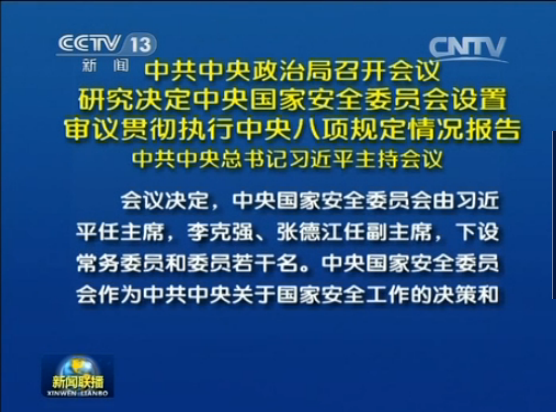 On January 24, the Political Bureau of the Communist Party of China (CPC) Central Committee convened a meeting to discuss about and decide the setup of the National Security Commission. The National Security Commission was headed by Xi Jinping; Li Keqiang and Zhang Dejiang were deputy heads of the commission, and there were several members and members in the commission, according to a decision adopted at the meeting. The National Security Commission, as a CPC Central Committee agency responsible for decision-making, deliberation and coordination on national security work, answers to the Political Bureau and its standing committee, and is in charge of making overall plans and coordinating major issues and major work concerning national security.
On January 24, the Political Bureau of the Communist Party of China (CPC) Central Committee convened a meeting to discuss about and decide the setup of the National Security Commission. The National Security Commission was headed by Xi Jinping; Li Keqiang and Zhang Dejiang were deputy heads of the commission, and there were several members and members in the commission, according to a decision adopted at the meeting. The National Security Commission, as a CPC Central Committee agency responsible for decision-making, deliberation and coordination on national security work, answers to the Political Bureau and its standing committee, and is in charge of making overall plans and coordinating major issues and major work concerning national security.
On April 15, 2014, Xi Jinping presided over the first meeting of the National Security Commission and delivered an important speech. Xi noted that we should value both traditional security and non-traditional security, build a national security system integrating political security, homeland security, military security, economic security, cultural security, societal security, scientific and technologic security, information security, ecological security, natural resource security and nuclear security. Information security has become an important part of the national security system.
-
Apr.15In April, MIIT, the Ministry of Public Security and the State Administration for Industry & Commerce jointly launched a special action against rogue programs on mobile Internet
-
 To ensure security of network and information, purify the environment of mobile Internet and protect the legitimate rights and interests of users, MIIT, the Ministry of Public Security and the State Administration for Industry & Commerce decided to jointly launch a special action against rogue programs on mobile Internet on a national scale between April 2014 and September of the year. On April 15, 2014, the Ministry of Industry and Information Technology, the Ministry of Public Security and the State Administration for Industry & Commerce issued the Work Plan for Special Action against Rogue Programs on Mobile Internet.
To ensure security of network and information, purify the environment of mobile Internet and protect the legitimate rights and interests of users, MIIT, the Ministry of Public Security and the State Administration for Industry & Commerce decided to jointly launch a special action against rogue programs on mobile Internet on a national scale between April 2014 and September of the year. On April 15, 2014, the Ministry of Industry and Information Technology, the Ministry of Public Security and the State Administration for Industry & Commerce issued the Work Plan for Special Action against Rogue Programs on Mobile Internet.
The Work Plan defined the guiding thought for the special action, specified that we should be guided by the spirits of the 18th National Party Congress and the third plenary session of the 18th CPC Central Committee, follow the work ideas of governance according to law and addressing both symptoms and rout causes, give full play to the functions of telecom, public security and industry & commerce departments as well as industry self-regulation and social supervision, strengthen the security management in the process of making, communication and use of mobile applications, crack down on in accordance with the law illegal activities that make use of rogue programs, protect legitimate rights and interests of the people and ensure network and information security. The Plan defined the goal of the special action, namely, discovering and disposing of rogue programs that have a large scale and can cause serious damage, urging application stores to establish a sound mechanism for security management of mobile applications, investigating a number of illegal and criminal activities that use rogue programs, cracking down on illegal profit-seeking activities that use rogue programs, raising users’ awareness of safety protection and striving to establish a permanent mechanism for governance of rogue programs.
The special action followed the work ideas of governance according to law and addressing both symptoms and rout causes, gave full play to the functions of telecom, public security and industry & commerce departments as well as industry self-regulation and social supervision, strengthened the security management in the process of making, communication and use of mobile applications, and strived to establish a permanent mechanism for governance of rogue programs on the mobile Internet. The special action consisted of three stages, namely preparations and deployment, intensive crackdown as well as consolidation and experience summary.
-
Jul.16On July 16, Chinese President Xi Jinping made a speech on Internet Governance in the National Congress of Brazil
-
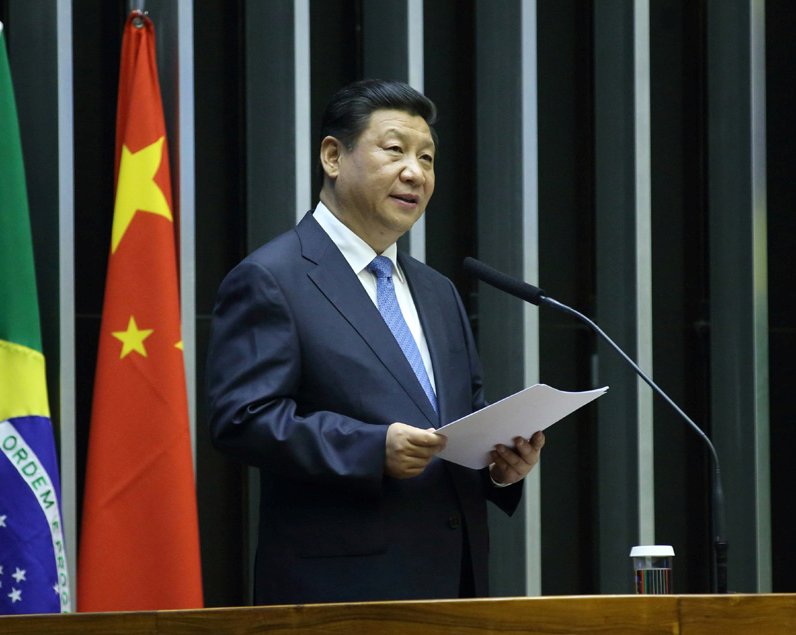 On July 16 (Brasilia Time), Chinese President Xi Jinping made a speech at the National Congress of Brazil entitled Carry Forward Traditional Friendship and Opening up New Chatper of Cooperation. He stressed that no matter how the Internet technologies evolve, no country shall infringe information sovereignty of other countries nor seek for its so-called absolute security at the cost of security of other countries.
On July 16 (Brasilia Time), Chinese President Xi Jinping made a speech at the National Congress of Brazil entitled Carry Forward Traditional Friendship and Opening up New Chatper of Cooperation. He stressed that no matter how the Internet technologies evolve, no country shall infringe information sovereignty of other countries nor seek for its so-called absolute security at the cost of security of other countries.
Xi Jinping stressed that, in today’s world, the development of the Internet raises new challenges to the national sovereignty, security and development interests of all countries, which must be seriously dealt with. Although the Internet is highly globalized, the sovereignty as well as rights and interests of any country in the field of information shall not be violated, and no country shall infringe information sovereignty of other countries no matter how the Internet technologies evolve. There is no double standards in the field of information. Every state is entitled to safeguarding its own information security. It is not allowed that one country is safe while other countries are unsafe or some countries are safe while other countries are unsafe, and no country shall seek for its so-called absolute security at the cost of security of other countries. The international community should, through active and effective cooperation, build a peaceful, safe, open and cooperative cyber space and establish a multilateral, democratic and transparent system for international Internet governance based on the principles of multilateral, democratic and transparent mechanism.
-
Aug.18On August 18, 2014, the Guiding Opinions on Promoting Integration of Traditional Media and New Media was adopted at the 4th meeting of the Central Leading Group for Comprehensively Deepening Reforms
-
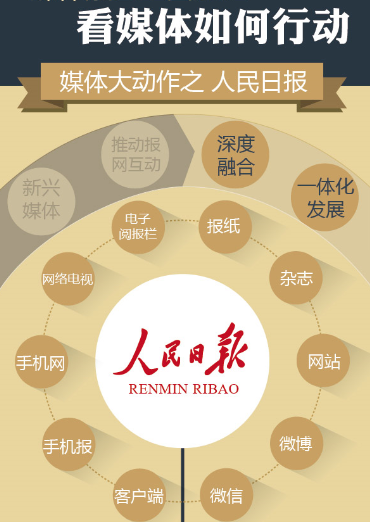 On August 18, 2014, the Guiding Opinions on Promoting Integration of Traditional Media and New Media was adopted at the 4th meeting of the Central Leading Group for Comprehensively Deepening Reforms. Xi Jinping, who is the head of the Central Leading Group for Comprehensively Deepening Reforms, stressed that, to promote the integrated development of traditional media and new media, we must follow the rules of news transmission and the rules of the development of new media, intensify the thinking of Internet, make traditional and new media complement each other and develop in an integrated way, adopt cutting-edge technologies and improve the quality of news products, promote in-depth integration between traditional media and new media in terms of content, channels, platforms, operations and management, spare no effort in forming a number of new types of mainstream media with multiple communication platforms, advanced transmitting methods and a competitive edge, establish several modern media groups with powerful journalistic strength, credibility and public influence, establish a modern communications system featuring high diversity and integrated development. We shall deal with the integration at the same time strengthen management, so as to ensure that the integrated development is carried out in the right direction.
On August 18, 2014, the Guiding Opinions on Promoting Integration of Traditional Media and New Media was adopted at the 4th meeting of the Central Leading Group for Comprehensively Deepening Reforms. Xi Jinping, who is the head of the Central Leading Group for Comprehensively Deepening Reforms, stressed that, to promote the integrated development of traditional media and new media, we must follow the rules of news transmission and the rules of the development of new media, intensify the thinking of Internet, make traditional and new media complement each other and develop in an integrated way, adopt cutting-edge technologies and improve the quality of news products, promote in-depth integration between traditional media and new media in terms of content, channels, platforms, operations and management, spare no effort in forming a number of new types of mainstream media with multiple communication platforms, advanced transmitting methods and a competitive edge, establish several modern media groups with powerful journalistic strength, credibility and public influence, establish a modern communications system featuring high diversity and integrated development. We shall deal with the integration at the same time strengthen management, so as to ensure that the integrated development is carried out in the right direction.
-
Sep.19On September 19, Alibaba, the world's largest e-commerce transaction platform went public on the New York Stock Exchange(NYSE)
-
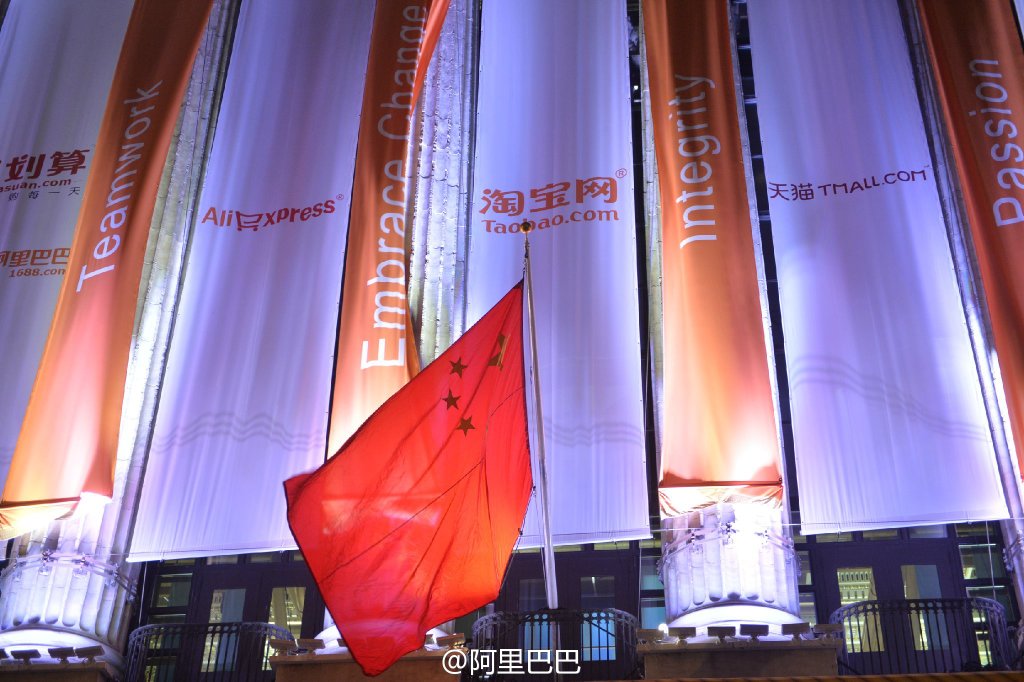 At the evening of September 19 (Beijing Time), Alibaba debuted on the New York Stock Exchange (NYSE) of the United States. Its Opening price soared and the market value jumped to USD231.4 billion at the close of transaction, exceeding that of Amazon and eBay combined. Assuming that its issue price was USD68/ADS, the financed amount of Alibaba had exceeded USD19.7 billion, the financed amount of VISA when it went public, hitting a record of the IPOs in stock market of the United States.
At the evening of September 19 (Beijing Time), Alibaba debuted on the New York Stock Exchange (NYSE) of the United States. Its Opening price soared and the market value jumped to USD231.4 billion at the close of transaction, exceeding that of Amazon and eBay combined. Assuming that its issue price was USD68/ADS, the financed amount of Alibaba had exceeded USD19.7 billion, the financed amount of VISA when it went public, hitting a record of the IPOs in stock market of the United States.
Since its founding in 1999, Alibaba took only 15 years to grow from a small Internet company in a small apartment into a Chinese e-commerce giant that is highly sought after in the Wall Street. The timelines that Alibaba went public in the United States are shown below:
On March 16, Alibaba announced that it had decided to begin the U.S. IPO process, so as to make its operations more transparent and internationalized and further realize its long-term vision and ideal.
On May 6, Alibaba filed to the United States Securities & Exchange Commission (SEC) for its initial public offerings (IPO), and the picked Credit Suisse, Deutsche Bank, Goldman Sachs, J.P. Morgan, Morgan Stanley and Citigroup as its underwriters.
On June 16, Alibaba released the names of the 27 partners for the first time and their current positions, the list of the nine members of the board of directors of the listed company to be set up as well as the latest financial data.
On June 26, Alibaba decided to apply for listing on NYSE, with the transaction code of "BABA".
On September 5, Alibaba expected that its IPO price of the ADSs per share would be between USD60 and USD66. It planned to issue 320 million shares of ADSs. In addition, Alibaba granted the underwritters the right to purchase up to an aggregate of 48.02 million additional ADSs.
On September 8, Alibaba launched a ten-day global road show in Waldorf-Astoria Hotel in New York, gaining much popularity among investors.
On September 15, Alibaba raised its estimated IPO price of the ADSs per share to the range between USD66 to USD68.
On September 18, Alibaba set IPO issue price to USD68 and the financed amount of USD21.8 billion, which exceeded that of VISA and became the largest IPO in the United States. If the underwriters exercise their rights of over subscription, it is expected that Alibaba will hit the record of financed amount of IPO in the world.
On September 19, Alibaba’s shares were officially listed for trading on NYSE under the symbol of "BABA".
The listing of Alibaba on NYSE became an iconic event of the global Internet sector, as its growth pattern represented the development trend of the Internet in the future, and the competition between the two Internet powers of China and the United States had taken shape. Meanwhile, the development of Alibaba has created lots of jobs for China and really changed the life of many people. The listing of Alibaba bounded to drive the entire industry to grow fast and thereby promoting China to make great headway in the Internet industry.
-
Nov.19On November 19, the 1st World Internet Conference Wuzhen Summit was held in Wuzhen, Zhejiang Province
-
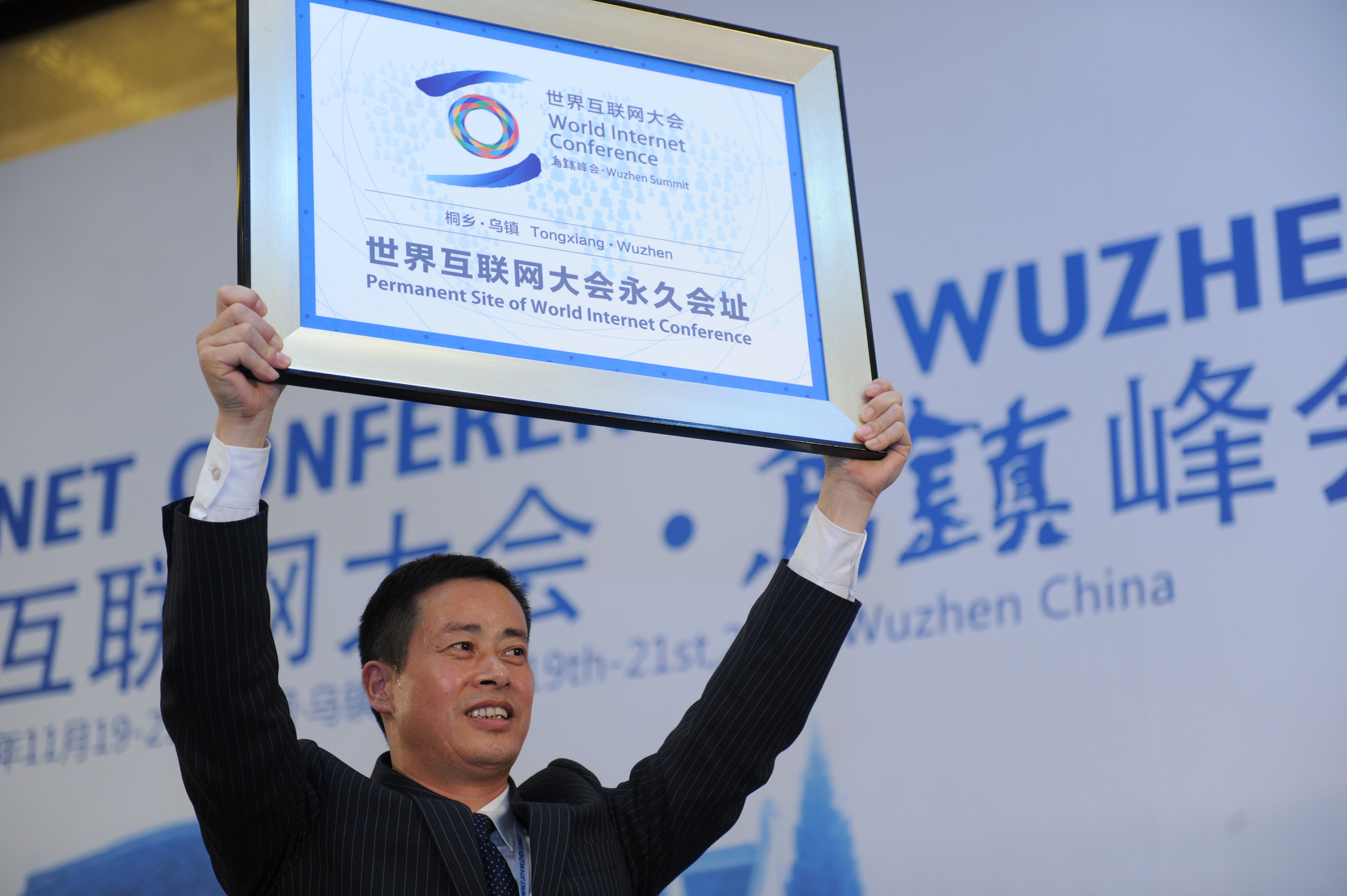 Between November 19 and 21, the 1st World Internet Conference was held in Wuzhen, Zhejiang. The conference was co-organized by the Cyberspace Administration of China and the People’s Government of Zhejiang Province, over 1,000 governmental officials, responsible persons of international organizations, experts and entrepreneurs from nearly 100 countries and regions across the world exchanged views on 10-plus sub-topics including international Internet governance, mobile Internet, Internet new media, legalization of cyberspace, Internet celebrities, cross-border e-commerce, cyber security and combating terrorism on the Internet centering on the theme of “An Interconnected World Shared and Governed by All”, discussed about the plans on the development of the Internet and reached broad consensus.
Between November 19 and 21, the 1st World Internet Conference was held in Wuzhen, Zhejiang. The conference was co-organized by the Cyberspace Administration of China and the People’s Government of Zhejiang Province, over 1,000 governmental officials, responsible persons of international organizations, experts and entrepreneurs from nearly 100 countries and regions across the world exchanged views on 10-plus sub-topics including international Internet governance, mobile Internet, Internet new media, legalization of cyberspace, Internet celebrities, cross-border e-commerce, cyber security and combating terrorism on the Internet centering on the theme of “An Interconnected World Shared and Governed by All”, discussed about the plans on the development of the Internet and reached broad consensus.
Chinese President Xi Jinping sent a message of congratulations to the conference. Xi said, with “An Interconnected World Shared and Governed by All” as its theme, the 2014 World Internet Conference has reflected the major issues of cyberspace that the international community is focused on. The Internet has turned the world into a global village and made the international community a highly interdependent community of common destiny. Meanwhile, the development of the Internet has posed new challenges to national sovereignty, security and development interests, which requires the international community to meet urgently and seriously and pursue common governance and win-win outcome.
>>The Next Year<<The Previous Year2014Milestones
